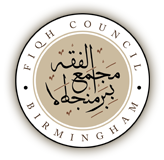Phone 07858 344 378 (9am-4pm Weekdays)
WELCOME to the Fiqh Council Birmingham (FCB). The FCB was establsihed to help meet the religious needs of the Muslim community. It offers faith based services in Islamic marital arbitration (Talaq/Khula etc.), training Islamic scholars and Imams, fatwa service and more...read more >
ARTICLES
Rights & Responsibilities After Talaq (Islamic Divorce)
Rights & Responsibilities
After Talaq (Islamic divorce)
Islamic divorce or Talaq is a part of human life just as marriage is a part of human life. However divorce from an Islamic perspective, is a phenomenon that is disliked and indeed detested by Allah Taala. Its consequences are far-reaching for all concerned including the wider society. The Messenger of God ﷺ said: “Of the permitted acts the most hated to Allah is Talaq (Islamic divorce),” (Sunan Abu Daud).
Having said this, God in His mercy allowed for Islamic divorce. A woman does not have to suffer in silence and Islam from the outset, over fourteen centuries ago, instituted breath-taking root and branch reforms that secured for a woman wide-ranging rights which entitled a woman to seek legal separation from her spouse. In Islamic law, if a husband was failing in his marital duties, and there was no way of reforming the husband's attitude and behaviour, it is the wife's Islamic right to seek the dissolution of her Nikah.The aim of this article is to assess the responsibilities and rights laid down by Allah Almighty in Islamic sacred law post Talaq with particular reference to the children.
Islam fully appreciates the important role both parents play in the upbringing of the children. In general, it is through the combined efforts of both the mother and father that helps enable children to grow up in a healthy and morally enriching environment. Thus, even after Talaq there are many levels at which Islam requires that both parents remain intrinsically involved in the lives of their children.
Importance of the Mother
The elevated status of the mother in Islamic teaching is based upon many facts. Firstly, it is the mother who has sacrificed so much to carry the child in her womb, cared for it through sickness and in health and then sacrificed her time and energy for the sake of her children. It is for this reason that when once a man asked the Messenger peace be upon him, who has the greatest right upon him, he replied “your mother.” The man asked twice more, then who? and he replied each time, “your mother.”
After replying thrice the Messenger peace be upon him said “your father.” It is also mentioned in a well-known Hadith that paradise lies at the feet of the mother, which indicates the importance Islam attaches to showing honour and respect to one's mother.
Importance of the Father
The honoured status of the father in Islam can be ascertained by the saying of the Messenger peace be upon him recorded by Imam al-Bukhari: "You and your wealth belong to your father". In Islam there are also many rights and duties upon the father regarding his offspring, even after an Islamic divorce the maintenance of the children is still binding upon the father according to Islamic law until they reach the age of independence. Also, even after Islamic divorce, his children remain his heirs. Likewise it is the right of the father and Islamically his duty as the guardian of his daughter, to help facilitate his daughter's marriage, including the reasonable financial expenses involved. So great is the role of the father that on the Day of Judgement a person will be summoned by the name of their father, which underlines the close relation between the father and his offspring in Islam. In another Hadith, sons and daughters have been commanded by the Messenger peace be upon him, to be aware of severing the link between themselves and their father: "The father is the best gate of the gates of Paradise, so either look after it if you wish or lose it". (Jami al-Tirmidhi).
Thus, in the light of the above lofty station accorded by Islam to both parents, it would Islamically be regarded as a moral wrong under normal circumstances, for a Muslim mother or a Muslim father who had custody of a child after Talaq, to prevent the other parent from seeing, meeting and being involved with their child's upbringing.
In conclusion, there are many rights which parents have over their children and similarly children have over their parents. The tragic incident of divorce, in accordance to Islamic teachings, does not end this relationship between a parent and their offspring as explained above. Thus, Islamically, all reasonable efforts should be made to enable both parents to have reasonable access to their children appropriate to the circumstances, as that is what is normally in the best interests of the child, the mother, the father and the wider society in general.
FCB Resource Library Articles Copyright 2015
